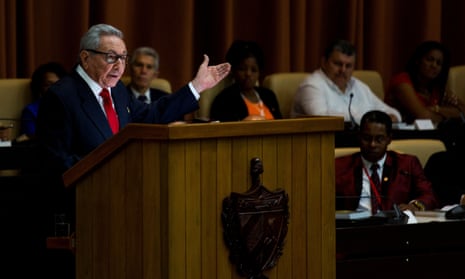Raúl Castro has promised that Cuba will never abandon its leftist ally Venezuela despite US “blackmail”, even as the Trump administration threatened more sanctions over its support.
In a speech to the national assembly, the head of the Cuban Communist party said the island had been increasing defense preparedness in recent months in view of mounting US hostility.
The island nation had also been adopting economic measures to contend with the Trump administration’s tightening of the decades-old US trade embargo, Castro told legislators.
“We will never abandon our duty of acting in solidarity with Venezuela,” Castro said. “We reject strongly all types of blackmail.”
The US vice-president, Mike Pence, told the United Nations security council on Wednesday the United States would announce additional action to hold Cuba accountable for its support of Venezuela’s president Nicolás Maduro.
Donald Trump’s administration has accused Cuban security and intelligence officials of propping up Maduro’s government. Cuba denies those claims.
“Cuba is being blamed for all evils, using lies and the worst kind of Hitlerian propaganda,” Castro said. “We have told the US administration Cuba is not afraid and will continue building the future of the nation without outside interference.”
Cuba’s national assembly was meeting to enact a new constitution which allows the government to launch a modest revamp of its centrally planned single-party system with dozens of laws expected on everything from the justice system to political structures.
Many observers are hopeful the government will open Cuba’s still inefficient state-run economy further to free enterprise with a law recognizing private businesses, not just self-employment, although they do not expect that to be among the first pieces of legislation it tackles.
That could give a boost to an economy which has had to contend with declining aid from Venezuela and a resulting cash crunch over the past three years, prompting the government to introduce austerity measures.
Shortages of basic goods have increased recently, including flour, eggs and chicken, with the state even reducing the size and circulation of its newspapers due to a lack of newsprint.
The situation could worsen further in coming months in view of the tightening US trade embargo, Castro warned.
That did not mean a return to the kind of deep crisis Cuba experienced following the 1991 collapse of its former benefactor the Soviet Union, however, as its economy had diversified since then, he said.
Cubans overwhelmingly ratified the new constitution in a February referendum after a year of debate, updating its 1976 Soviet-era Magna Carta.
While it retains socialism as “irrevocable”, it codifies changes in Cuban society since 1991, like the opening of the economy to free enterprise, and includes a political restructuring among other changes.
